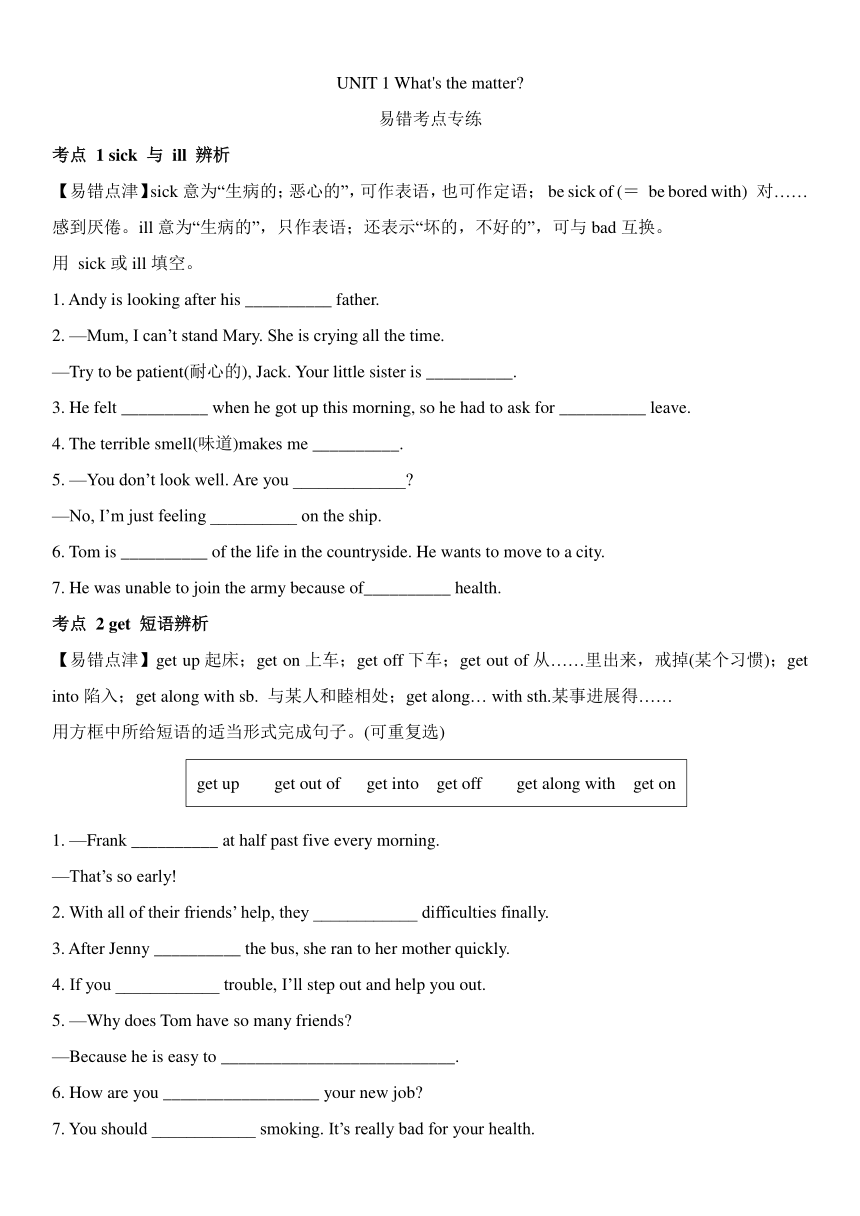
UNIT 1 What's the matter 易错考点专练 考点 1 sick 与 ill 辨析 【易错点津】sick意为“生病的;恶心的”,可作表语,也可作定语; be sick of (= be bored with) 对……感到厌倦。ill意为“生病的”,只作表语;还表示“坏的,不好的”,可与bad互换。 用 sick或ill填空。 1. Andy is looking after his _____ father. 2. —Mum, I can’t stand Mary. She is crying all the time. —Try to be patient(耐心的), Jack. Your little sister is _____. 3. He felt _____ when he got up this morning, so he had to ask for _____ leave. 4. The terrible smell(味道)makes me _____. 5. —You don’t look well. Are you _____ —No, I’m just feeling _____ on the ship. 6. Tom is _____ of the life in the countryside. He wants to move to a city. 7. He was unable to join the army because of_____ health. 考点 2 get 短语辨析 【易错点津】get up起床;get on上车;get off下车;get out of从……里出来,戒掉(某个习惯);get into陷入;get along with sb. 与某人和睦相处;get along… with sth.某事进展得…… 用方框中所给短语的适当形式完成句子。(可重复选) 1. —Frank _____ at half past five every morning. —That’s so early! 2. With all of their friends’ help, they _____ difficulties finally. 3. After Jenny _____ the bus, she ran to her mother quickly. 4. If you _____ trouble, I’ll step out and help you out. 5. —Why does Tom have so many friends —Because he is easy to _____. 6. How are you _____ your new job 7. You should _____ smoking. It’s really bad for your health. 8. After saying “Goodbye” to their parents, they_____ the train and started their new journey. 考点 3 thanks to 与 thanks for 辨析 【易错点津】thanks to意为“多亏;幸亏”,还可以表示“由于;因为”,相当于“because of ”。thanks for意为“为……而感谢”,for 强调感谢的原因,相当于thank you for…,for后常用n.或v. ing形式。 用thanks to 或thanks for 填空。 1. _____ Linda, I finished the work on time. 2. _____ telling me your experience, Jim. 3. It was all a great success—_____ a lot of hard work. 4. The day before National Day is also a festival set in 2018. It is a day to show _____ the soldiers dying in the war. 考点 4 be used to / used to / use...to... 辨析 【易错点津】used to do sth. “过去常常做某事”,指过去的习惯性动作,现在已不再保持这样的动作或习惯。be used to “习惯于;适应于”, to是介词,后跟名词、代词或动名词。use sth. to do sth. “用……来做某事”。 一、用所给词的适当形式填空。 1. He used to _____ (play) basketball when he was young. 2. My mother is used to _____ (get) up early. 3. He _____ (use) his knife _____ (cut) up the vegetables yesterday. 二、根据汉语意思完成句子,每空一词。 4. 布鲁斯过去很害羞,但现在他很自信,也很活跃。 Bruce _____ _____ _____ shy, but now he is confident and active. 5. 我爷爷过去常在晚饭后在家看电视,但现在他习惯了出去散步。 My grandfather _____ _____ _____ TV at home after dinner, but now he _____ _____ _____ _____ out for a walk. 考点 5 surprise,surprising 和surprised 辨析 【易错点津】surprise n.意想不到(或突然)的事;令人惊奇的事(或消息等);v.使诧异;使感到意外。 surprising adj.令人吃惊的;使人惊奇的 ... ...
~~ 您好,已阅读到文档的结尾了 ~~